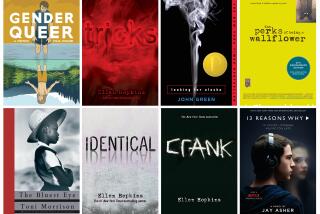College Textbook Prices Criticized
- Share via
A national student activist organization stepped up its criticism of college textbook publishers Tuesday, asserting that the industry imposed exorbitant wholesale price increases totaling 62% over the last decade on top-selling books. That amounts to more than double the nation’s overall rise in consumer prices during the same period.
“Textbook prices are skyrocketing, and publishers continue to use gimmicks to inflate the price, making higher education less affordable,” said Merriah Fairchild, a Sacramento-based higher education advocate. She worked with the national State Public Interest Research Groups organization in preparing a new report on textbook pricing released Tuesday.
The activist organization also complained that the textbook publishing industry charged U.S. students more than foreign students for the same texts. It found that the average textbook cost 17% more in the United States than it did in Britain. In all, it estimated that the average U.S. college student spent about $900 a year on textbooks, although industry officials put the figure at $625.
The college textbook industry called much of the report badly flawed, saying the findings were based on a small sampling of popular but costly textbooks that exaggerated the overall rise in prices to students. Industry officials also maintained that the price of textbooks had risen more slowly than college tuition and fees.
They also sought to shift some blame for costs onto college instructors and their faculty committees, saying that they were free to order less expensive texts for their students. Professors “are in control of that choice,” said Bruce Hildebrand, executive director for higher education with the Assn. of American Publishers.
But Hildebrand also said that the student organization’s estimated 17% gap in prices of texts sold in the U.S. compared with those in Britain “seems reasonable.”
The United States “is the richest market in the world. You sell into what the market will handle. It’s like Coca-Cola sold for less overseas,” he said.
The report -- titled “Ripoff 101: 2nd Edition” -- is a follow-up to a smaller-scale study released a year ago. Like the previous version, it accused the industry of a variety of ploys to inflate textbook prices.
Among other things, it said publishers released unnecessary new editions of texts every few years as a way to push up prices and make less expensive used books obsolete.
The activist organization also repeated its contention that publishers often packaged textbooks with unneeded instructional materials such as CD-ROMs and workbooks to drive up the price.
Last year’s report was reviewed by a congressional panel in July and helped spur various proposals in state legislatures around the country.
California lawmakers, for example, passed a law last year urging college instructors to take price into account when selecting textbooks for their classes. It also prods campuses to promote sales of used textbooks.
The California law dovetails with renewed calls Tuesday by the student organization for college instructors to demand low-cost books, and for colleges to sponsor book-swapping and book-rental services to reduce costs.
Albert N. Greco, a Fordham University business school professor who studies the college textbook business, said the methodology of the student group’s study probably exaggerated the rate of price increases in the overall college textbook market. At the same time, he faulted the industry for failing to do more to hold down costs.
He said publishers could limit expenses by issuing more low-cost supplements to update textbooks rather than bringing out new editions every few years.
“Why the publishers don’t do this, I don’t know,” he said.
The student activist organization based its estimated 62% wholesale price increase on a survey of 59 colleges and universities around the country, looking at the costs of the five most widely purchased textbooks on those campuses.
More to Read
Inside the business of entertainment
The Wide Shot brings you news, analysis and insights on everything from streaming wars to production — and what it all means for the future.
You may occasionally receive promotional content from the Los Angeles Times.









